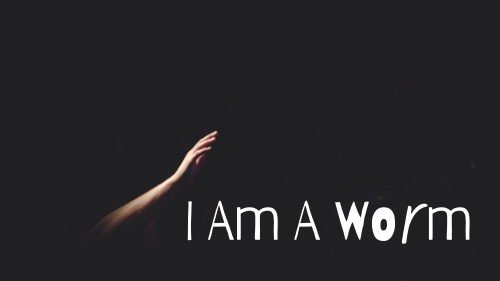
Almost every week I tell my wife that I want to write happy blog posts. I want people to feel good. Why can’t I write like those smiling preachers who tell everyone that Christians should just be prosperous and happy? Why do I have to write articles like “I Am a Worm”?
Oh, yes, the Bible talks about joy. And, I believe the Christian life should be filled with joy. But, as I read scripture, joy is usually found in adversity or is a product of suffering. Joy floods scripture, but happiness? Not so much. The closest it seems to come is the contentment one finds in doing the will of God.
One of the Psalms, as a matter of fact, a lot of the Psalms, deals with God at work through some of life’s struggles. And we’re not talking stumped toes and skinned knees here.
I Am a Worm: God Doesn’t Care
In fact, this Psalm starts off with a claim of being forsaken by God. It’s hard to get much lower than that. We’re approaching that “I Am a Worm” territory here. I cry, I call, I weep and You don’t answer. I can’t even sleep at night. Have you ever felt alone and fearful. Perhaps you’ve even wondered where God was. I know the fear of my prayers not going any higher than the ceiling – if that far.
Yet, God is holy. Our praises lift Him high. Others trusted in Him and He rescued them. They called out and He provided safety. They were not disappointed.
WHAT ABOUT ME? Maybe, I am a worm.
I Am a Worm: People Don’t Care
Oh, look, it even shows up here. Quoted: “I am a worm and not a person.” What?!?
Not only forsaken by God, but mistreated by others. They despise me. They don’t care. I’m laughed at and humiliated. “He trusts God. Let God take care of him,” they say. Have you ever been so low that you were sure no one else cared about you?
Yet God caused me to trust in Him from my early years. He can’t be far away.
But the tormentors continue. It’s so difficult, on the inside, I just want to give up. My life is in the dust. Didn’t we say it already, “I am a worm.”
God, You can’t be far away. Help! Hurry! Save me!
What? Praise? Where Did That Come From?
Let us praise God together. All who fear Him, praise the LORD! Stand in awe. He has not hidden His face; He has heard my cry. All will come and worship Him. Certainly, we will declare that He is righteous to all who come after us.
Wait… How did we get from “I am a worm” to “Praise the Lord”?
Let’s look at the rest of the story.
It’s All about Jesus
Psalm 22 is considered a prophetic psalm of Christ’s suffering and death on the cross.
Therefore let’s consider these words from that understanding.
“My God, my God, why have You forsaken me?” These were words that Jesus quoted from the cross. We may feel forsaken by God, but we cannot imagine how it felt for Jesus to be abandoned by His Holy Father in that moment. In addition, to the agonizing pain of crucifixion, the pain of utter aloneness fell upon Him.
“I am a worm…despised by the people. All who see me deride me; They sneer, they shake their heads.” Let God “rescue him, because He delights in him.” These words from this Psalm are the words testified by the gospel writers about those gathered to witness Jesus’ death.
The Psalm continues to describe both the insults of the people and the physical agony of that day. “I am poured out like water, And all my bones are out of joint.” “My tongue clings to my jaws; And you lay me in the dust of death.” “They cast lots for my clothing.” Again, events witnessed by the apostles and told in the gospels.
Then the words of praise begin.
I Am a Worm: What Does It Mean?
Isaac Watts in his hymn that we call “At the Cross” or “Alas, and did my Savior bleed” used this Psalm for part of his inspiration. His original words were:
Alas, and did my savior bleed,
And did my Sovereign die?
Would He devote that sacred head
For such a worm as I?
We don’t like that word “worm.” It goes against our ideas of “self-esteem.” How can we ever become anyone if we think of ourselves as lowly worms? Why, they even changed the hymn so that it reads, “For sinners such as I?” Yes, it works, but it softens the blow. Therefore, we feel better: we’re only sinners, not worms. But, why would we need self-esteem? That is to say, all that I am and all that I have comes from God. Compared to His holiness and righteousness, I am a worm. Yet in His love, grace, and mercy, God has raised me up to become His child. No longer the worm, but the butterfly! In short, why would we shun this word?
Jesus: “I Am a Worm”
In addition, although like Watts, we are usually applying this phrase, “I am a worm” to ourselves, a beautiful picture emerges when we recall that this is a Psalm about our Savior and His death. All through the Old Testament, the Hebrew word is translated either by the word “worm,” usually associated with maggots (yes, that’s pretty low and nasty), or with the word “scarlet.” Apparently, the reference is to a particular worm. I was reading (see the reference below in Resources*) that the female of this worm attaches herself so firmly to a tree when she is about to give birth that she will die there unable to free herself. Then, as she dies, a red substance is released that at one time was collected and used as a scarlet dye.
You see the significance. In the same way, Jesus, our Lord, went to the tree, the cross, and would not come down. In effect, He died, shedding His blood that we might be “born.”
Here We Find Joy
So, Jesus died an agonizing death, forsaken of God, surrounded by those who hated Him, who abused Him. There was no happy, happy, happy here. Yet, the Bible tells us to look at Jesus, “who for the joy set before Him endured the cross, despising the shame, and has sat down at the right hand of the throne of God.” (Hebrews 12:2 NASB) We can also read, “Weeping may last for the night, But a shout of joy comes in the morning.” (Psalm 30:5b NASB) The suffering, the weeping, the adversity, the difficulty was on the cross. The joy came with the resurrection.
Because He lives, we too can live. No matter what we encounter in this life, it is no more than our Savior bore. Moreover, with His resurrection and offer of abundant life, we can find joy through it all.
For Such a Worm As I: the Hymn
Alas! and did my Savior bleed,
And did my Sov’reign die?
Would He devote that sacred head
For such a worm as I?
Was it for crimes that I had done
He groaned upon the tree?
Amazing pity, grace unknown,
And love beyond degree!
Well might the sun in darkness hide,
And shut his glories in,
When God, the mighty Maker, died
For man the creature’s sin.
Thus might I hide my blushing face
While His dear Cross appears,
Dissolve my heart in thankfulness,
And melt mine eyes in tears.
But drops of grief can ne’er repay
The debt of love I owe;
Here, Lord, I give myself away,
‘Tis all that I can do.
“Alas, and Did My Savior Bleed” by Isaac Watts (1707)
from the Evangelical Lutheran Hymn-book (1918) #214
Blessings,
Richard
Resources
Read more about the worm: Editor’s Note to John Gill’s Exposition at biblestudytools.com.*
Read Psalm 22 in the NASB at BibleGateway.com.
If this article ministered to you, you might also be encouraged by Count the Cost or Wrong Turn.

Interesting and really made me think. I recognize feeling like a worm… Scripture and hymns, though say better of me. The idea that Jesus felt this way also is a very interesting and awakening thought. Thank you, Richard!
Thanks, Nathalie! I’m glad it was thought provoking. Sometimes I fear that Christians today prefer to take the less thoughtful road. In doing so, we can end up with a Christianity that doesn’t reveal the truth above Jesus.
In addition, our society calls for us to focus on our self-identity, self-fulfillment, and so many other selfies (ha, those favorite photos we like to take can even play into this). However, God calls us to realize that without Him we are nothing, but in Him we become that beautiful butterfly that brings glory and honor to Him.
Thanks again for sharing!
Blessings!
This was great and I actually had not really thought of the word worm in that Hyman after singing it for years. Thanks for your explanation, Richard. Yes, we as Christians can always have joy and peace within because of Jesus.
Thank you for sharing, Sara! I appreciate your support and encouragement.
This was challenging to write, but I’m glad that you saw the beauty of joy that is ours through Christ.
Blessings!